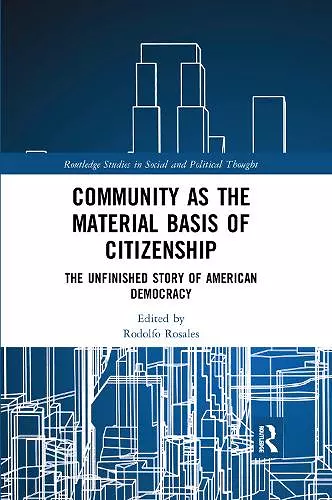Community as the Material Basis of Citizenship
The Unfinished Story of American Democracy
Format:Paperback
Publisher:Taylor & Francis Ltd
Published:10th Jul '19
Currently unavailable, and unfortunately no date known when it will be back
This paperback is available in another edition too:
- Hardback£135.00(9781138080935)

Community as the Material Basis of Citizenship addresses community as the site of participation, production, and rights of citizens and brings to bear a profound critique of a collective process that has historically excluded working class communities and communities of color from any real governance. The argument is that the status of citizenship has been influenced by a society that emphasizes the role of property in defining legitimacy and power and therefore idealizes and institutionalizes citizenship from an individualistic perspective. This system puts the onus on the individual citizen to participate in their governance, while the political reality is that organizations and corporations and their interests have great power to influence and govern. The chapters present an exciting departure from the long-standing traditions of the social basis of citizenship. In Community as the Material Basis of Citizenship, Rodolfo Rosales and his contributors argue that citizenship is a communally embedded and/or socially constituted phenomenon. Hence, the unfinished story of American Democracy is not in the equalization of communities but rather in their ability to participate in their own governance – in their empowerment.
'As the American nation has become increasingly heterogeneous, issues ordering the black-white binary have receded, but not disappeared. Instead, as economic and social factors have attracted Latino, Asian, African and other immigrants in larger numbers, assumptions about who is American and who is a citizen have become increasingly important. This volume offers discussions of citizenship across a number of racially and ethnically distinctive groups, and also locates the concept within the framework of community. Rodolfo Rosales and his colleagues consider how differing communities define citizenship and push us beyond the original definitions, based on individual, male, European, property owners. This will be a challenging, thoughtful, feast for any scholar and teacher of racial and ethnic political and social life.' - Dianne Pinderhughes, Chair of the Department of Africana Studies; Professor Department of Political Science, University of Notre Dame
'In this innovative, thought-provoking book, editor Rodolfo Rosales has orchestrated a brilliant theoretical symphony, in which an interdisciplinary team of scholars presents a modern communitarian view of citizenship, a status made real, they argue, not on the basis of legally prescribed and protected individual rights (which can be, and frequently are, abridged), but because individual participants—citizens—exist within, and draw political meaning and empowerment from, their proximate and cultural communities. This important book is brimming with cutting edge ideas from its authors’ many (but complementary) perspectives, from fields as diverse as political science, human cognition, social theory, labor studies, tribal governance, law and society, feminism, Chicanx studies, environmental and food justice, Asian American studies, Black studies, and many more. With a deeply humanistic view of people and their places, whether large or small, rural or urban, tribal, migratory, or international, this book’s chapter authors show how the profound agency of communities offers hope for contemporary struggles, fostering greater and more powerful democratic participation, even in this profoundly anti-democratic moment. Community as the Material Basis of Citizenship is a vibrant and visionary book, sounding just the right notes of hope and progress, for students and scholars of social and political theory, urban, ethnic, and community studies, race, ethnicity, and politics (REP), critical race theory, and related fields.'- Tony Affigne, Professor of Political Science and Black Studies, Providence College
'This volume provides an important road-map for anyone wanting to understand citizenship and belonging in the context of our challenging environment. The authors skillfully weave together critiques of individualistic citizenship with compelling stories of community and empowerment drawn from collective identities tethered to race, ethnicity, gender immigration, self-determination, sovereignty, residency, and space. Whether it is Joy James's critical account of African American women's struggle against "dishonored citizenship;" or Marisol Cortez's analysis of residents of the Mission Trails Mobile home park struggling to claim space in the face of relentless urban development; or Kim Geron and Danvy Le's examinations of Asian American's use of cultural citizenship to counter narratives of "perpetual foreigness" the volume serves as a catalyst to challenge, disrupt and revive citizenship through an enduring commitment to community.'- Anna Sampaio, Associate Professor, Santa Clara University
ISBN: 9780367372101
Dimensions: unknown
Weight: 340g
184 pages